Lieutenant General and Chief of Army Staff, Tukur Yusuf Buratai insists Boko Haram militants have been dislodged from holding any territory in Nigeria but have not resorted to hit-and-run attacks to create the impression that they are on a resurgence.
The army chief said, in an interview with three national dailies during the week, that the war against the terrorists is “complicated” because the military is hampered by the non-kinetic aspects such as lack of access roads to some local governments.
He repeated his claim that Boko Haram militants now live among local communities, making it easy for them to launch attacks in furthering their “propaganda” that they are still a strong force.
“When it escalates, you have situations like arson, as we witnessed in Auno recently. I would say that what is happening now is criminality because, since last year, we have not given Boko Haram any respite,” he said.
“They are trapped and no longer have access to food; their movements are constrained due to lack of logistics because we have strangulated them. So now, they are distressed, and this is why you see that any opportunity they come out with a vengeance and attack commuters and unfortunately targeting certain religious persons just for their propaganda, and this also is one of the terrorist strategies.”
In the first part of the interview published earlier, Buratai said Nigerian Ruler, Muhammadu Buhari should not be pushed into sacking his service chiefs “because he knows where the problems are”.
He also said contrary to the notion that Boko Haram started in 2009, the “brainwashing and indoctrination” started over 30 years ago, thereby making it difficult to totally wipe out terrorism.
Below is the concluding part of the interview.
Many Nigerians believe that the military is not doing enough to secure the country, and from 2015 to date, the security situation has deteriorated. People now feel unsafe to travel by road. The Borno state governor has come out to state that three local governments are under the occupation of Boko Haram. How possible is it for a ragtag and untrained group would be defeating the Nigerian military in battle?
First of all, we have to look at the role of the military. You said we have to secure the country; we have to protect the country because people are being killed and abducted, and so on, and it is heaped on the military. That is the wrong direction if everything is heaped on the military. I said this earlier because if you look at section 217 (1), (2), (3) and (4) of the constitution, there are stipulated that our priority is to defend the country from external aggression. The question is, have we got any external aggression from any country or force? There is also the issue of protecting our sovereignty from the violation. Are we not doing it? I mentioned earlier of the narrative on how we intervened in 2015 and 2016 to stop foreign encroachment.
If, as of 2015 and 2016, we had gallant Ghanaian forces, troops from Argentina and others from different parts of the world coming under the United Nations or African Union forces, rest assured that this crisis would last for another 50 to 100 years and Nigeria would effectively be divided. This is the responsibility of the military, promoting world peace and we are doing that. We have troops in Mali and the Gambia, as well as Sudan. This is our constitutional responsibility and the last one which is coming to the aid of the civil authorities. This is the last of our priorities and only when called out to assist the civil authorities, and this is what we are doing. In a way, we have an institution with that primary responsibility to maintain law and order, and this is an issue of law and order. All that you have highlighted is about law and order, and it is the responsibility of the police to ensure law and order. I tell you that what we have done to support the police and if we have not come out from 2015 to date, I am not sure you would have been able to move around freely, let alone conduct this interview here.
If we give you reports of our weekly activities and our efforts to support the civil authorities, you would be amazed in terms of the recovery of arms and ammunition, the rescue of abducted persons, and so on. I must state that in solving the problem, you don’t use force alone, what about the non-kinetic approach such as development. Several places don’t have roads and schools with a high level of illiteracy. These are some of the things that would breed insecurity.
Now coming to the north-east and the issue of three local government areas under Boko Haram, it’s relating to the problem of development. The problem is that most times when I speak, some would read meaning to me being antagonistic of some administration in Borno state. The three local governments mentioned… there is none that we don’t have troops deployed. Let me say that about three to four local government areas cannot be accessed by road. There are specific periods during the raining seasons that these local government areas are locked. You can’t move in, and you can’t move out. It’s either you paddle a canoe, or you stay back. This is why I mentioned the comprehensive approach earlier.
So if somebody cannot access those local government areas because of lack of access, how come he knows that the local government area is under the Boko Haram occupation? There is no local government area in Borno state that we don’t have troops. If we don’t have forces, we visit such local government areas on patrol daily. This is aside from that several communities are inaccessible by road and whom do you blame for that? Most of those facilities were destroyed by Boko Haram when they occupied those local government areas. For instance, in 2017, we deliberately moved to all the local government areas. We said all the people should go back, and the people were happy to return to their communities. However, there were no corresponding developmental efforts to restore those facilities and infrastructures for people to return and live their normal lives. Do you even go to a local government area that is empty? It is not that we are not present there, but when you don’t encourage these people to return by providing the necessary amenities and how is that the fault of the military?
It is indeed a complex operation, and I tell you this. There is nowhere you won’t find Boko Haram. Even in Lagos and Kaduna. There are also more across the north-east. That is the truth. But the good news is that we have been tracking them and arresting and taking them into custody. I must state that we must try to differentiate between insurgency and terrorism, and this much I have stated at the national assembly. So there is no local government area under the Boko Haram occupation. They attempted to establish their caliphate in Gwoza, but they have not been successful. That is insurgency and why one of the questions asked about technical defeat. Boko Haram is not occupying any territory, and technically, that is the end of the insurgency.
But what about terrorism? It would outlive you and me because terrorism, just like armed robbery, kidnappings, burglary, cultism, are part of our daily lives. These are all smaller parts of terrorism. But when it escalates, you have situations like arson, as we witnessed in Auno recently. I would say that what is happening now is criminality because, since last year, we have not given Boko Haram any respite. They are trapped and no longer have access to food; their movements are constrained due to lack of logistics because we have strangulated them. So now, they are distressed, and this is why you see that any opportunity they come out with a vengeance and attack commuters and unfortunately targeting certain religious persons just for their propaganda, and this also is one of the terrorist strategies.
Now you say Boko Haram is everywhere, and nobody can move around. I recall that the office of THISDAY newspaper in Abuja was attacked at some point, and since then, has it happened again? The headquarters of the United Nations was bombed, and how there been a repeat with the last five years? As well as the attacks in Madalla, Suleja and Nyanya that is in the center of Nigeria. Then you talk of Kano state and the several motor parks that were attacked, there were several suicide bombings and the likes. I say that from 2014 up to 2015, there was no day you would wake up and not hear of one suicide bombing either in the church or the mosque or the motor park. Are all these happening now? Is this resurgence? Are the troops not working day and night to restrict these people?
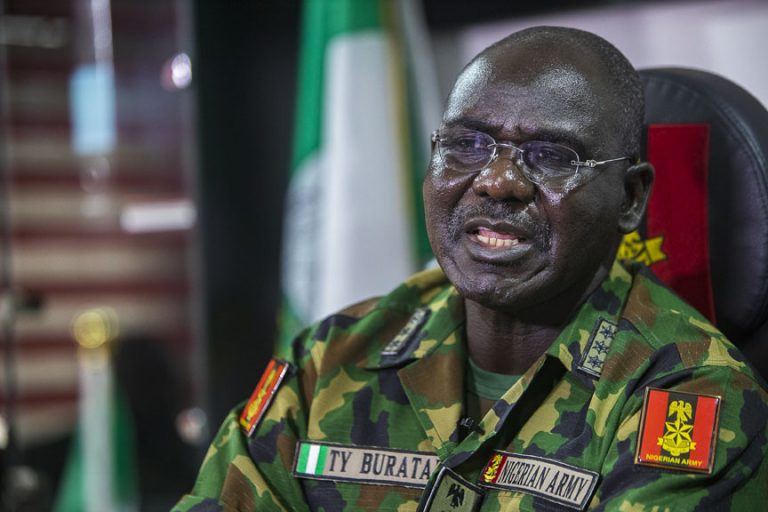
You can’t even say the whole of Borno state because the center is this critical road, which is the Maiduguri/Damaturu road that is all and then a few remote areas. And with all of these in place, you would say Boko Haram has returned? Just look at the propaganda that is making the whole world believe that all the efforts that have been made over the years have come to nullity, which is no correct. But the general public is meant to think this is because of the level of propaganda. This is where the media have to come in because this propaganda is affecting our National Security and unity. The media is there to inform, educate, and entertain. And we also ensure that we interact, to educate, and inform, and we can even entertain as well.
You came up with the idea of the Super Camp strategy and how effective it has been in the operations?
In military strategy or tactics, you must always anticipate, and this anticipation is based on your experiences as well as those of others. We introduced the Super Camp strategy last year, and we have applied all the tactics and strategy of the operational acts that we have been taught, we discovered that we could not continue along the same line because this is asymmetric warfare. We discovered that if we continue in the same manner and what people are envisaging and speculating and propagating now is what they have wanted to happen, which is the total breakdown of law and order. But as soon as we changed the tactics, the tide turned. And that is the introduction of the Super Camp.
What is Super Camp? It is just a concept, and because they heard Super Camp, they felt we would concentrate everybody in one location to defend that location without moving out. This is a very faulty misconception. The super camp is meant to harness all our resources to be targeting and blocking locations and to project force to where the threats are coming from. We dominate the whole of the theatre of operations and with enough force to project. If we had allowed these threats up till December last year, nobody would be in Maiduguri probably by now because of the level of propaganda and also the effect of our shortcomings. So we had to realign and adjust, and this has helped us in the economy of efforts to make sure that we prioritize to avoid wastage. It enabled us to achieve surprise and concentration and improve the morale of the troops. These are principles of war.
Now instead of having soldiers scattered all over, without proper coordination and support, we had to introduce the super camp where there would be enough troops and equipment to coordinate to deploy patrol and clear effectively, rather than separating them, and they become ineffective. So we achieved concentration with our troops, and this brings me to the issue of Maiduguri/Damaturu road. There was no attack on that road since 2015, and nobody had given any thought to the Maiduguri/Damaturu road. It was within this period when we changed the tactics and realigned, and they found the whole place untenable. As such, they have resorted to propaganda and sentiments, and unfortunately, there has been political interference because the people that are loving there are directly or indirectly supporting the insurgents to be in their communities and to be in their midst. When we identify and remove, these same people would say we are punishing innocent people and the likes; they would be telling us to target the Boko Haram members. The question thus is who are the Boko Haram members when they are in the midst of the people and how do you identify them when they do not wear uniforms.
It is only when you see them carrying weapons, and they hardly carry weapons openly. So these are the complexities that we have to continue to contend with. So our super camp concept has come to stay and borne out of the experiences and challenges we have had. It has come to stay and to be the most effective strategy in the present circumstances. And with the execution of the concept and along the line, there are gaps; we would adjust, redeploy, and amend. But if it proves to be ineffective in the future, we have to change, and that is flexibility, which is another principle of war. So we are doing things most professionally because they are desperate now, and that is one thing that we should all take note of. This is the point where they would continue to make noise and spread their propaganda, and we are not going to rest until we deal with them decisively.
On the issue of when will the Boko Haram insurgency end, I think I mentioned earlier that insurgency has ended with the technical defeat of Boko Haram. However, terrorism would persist just like in any other country that has had to deal with the insurgency. Even Columbia has had to deal with terrorism for over 50 years, and there are still pockets of terrorism here and there. This is what people must understand, and effectively, we would continue to deal with those that carry arms in the north-east and other parts of the country to ensure that we get our country secured.
There’s image problem for the military arising from the negative perception of their involvement in either during elections or through the various military operations across the country. The concern of Nigerians and critics is that soldiers use excessive force, and they abuse human rights and the allegations of extortion by soldiers, as evident in the accusation by Governor Zulum in recent times…
Excessive force, human rights, and extortion. There is a serious misconception of the role of the military, which I mentioned earlier. It is not our wish to be called out to perform police duties; however, since we have been called, we must do it because it is a national duty and a presidential directive that we must obey. It did not start today; it has been on since independence it has been on, and we have been performing these duties because even during the civil war, we were called out in what was initially a police action, it turned out to be a civil war, and the military was called out. And since then, we have been involved with a couple of internal security issues, which primarily is the responsibility of the police.
We are trained not to maim but to kill. That is the training, and so in the first place, when you don’t want such things to happen, then don’t call the military out. But when we are called out, and even though we are trained to kill, we have rules of engagement as well as the human rights code of conduct. We obey the international humanitarian laws, and in doing so, every soldier on the ground who was called out is aware. We don’t just use force for the sake of it. But based on the threats because there are guidelines such as if anyone attempts to kill anyone or issue a threat to somebody and so on, the use of force comes in.
We don’t apply the use of force deliberately to quell riots or just for the fun of it. But whatever that is done, there are always those that always have one way or the order to misapply it and those cases are investigated. If they are found culpable, they are dealt with accordingly. So it is not in our character, and we don’t have any rule that says once a soldier is called out, he should go and kill without justification. While we are trained to use force, we are also trained to protect lives and properties and also to apply the fundamental principles of human rights as enshrined in our constitution.
On the issue of extortion, it is unfortunate that things of this nature happen. And these are isolated cases because we have over 100,000 troops. If one or two misbehave, it does not reflect the policy of the Nigerian Army for extortion to be carried out. These are exceptions, and unfortunately, also the society is not helping matters because, at several places, we have written warnings for people not to give money or any form of inducement to soldiers because they are paid and they their allowances and others. So any soldier that dies that is committing a crime. So it is not our policy and not a directive, and anyone that is caught would be dealt with according to the military justice system. These are exceptions, and it is not suitable for generalization and maligning a highly respected institution that is there for the people.
What word of comfort do you have for the Nigerian people in the battle against insurgencies?
The insurgency that we have been having in the country, which is now called terrorism, is not the insurgency in the real sense because it was an insurgency that brought it. Even though we generally tagged it as insurgency, what we are experiencing now is terrorism, and I call on Nigerians to understand the critical situation that is happening in the north-east and across our country. We are making every effort to contain this insurgency by developing technical and human capacity to deal with this s well as the collaborations with all other security agencies. It is not the responsibility of the military alone. Other security agencies and every Nigerian have a role to play. And I am happy that the issue of community policing is coming on board by the Nigerian police and everybody should cooperate to ensure that the new community policing initiative succeeds because that is the best way we can secure our country.
Also, getting information and passing it rightly also counts. Like in the Nigerian Army, we have our platforms on Instagram, email, SMS and other social media platforms are there for the members of the public to lay complains about human rights abuses and other critical issues. We want to thank Nigerians for their continuous support, and the Nigerian Army is committed to protecting our territorial integrity and to defend our country from external aggression and be rest assured we would not allow anything to affect this all-important and sacred responsibility that we have been ordained through our constitution and by the grace of God we shall abide by it.
You may be interested

Orban’s Lyon Face Provisional Relegation To Ligue 2 Amid Financial Woes
Webby - November 15, 2024Olympique Lyon the club of Nigerian striker Gift Orban, have been handed a provisional Ligue 1 relegation by theDNCG who…

Ghana Miss Out On AFCON 2025 Qualification After Draw With Angola
Webby - November 15, 2024Black Stars of Ghana’s hopes of qualifying for next year’s AFCON was ended after they played a 1-1 draw away…

‘It Was A Fair Result’ — Troost-Ekong Reacts To Super Eagles Stalemate Vs Benin Republic
Webby - November 15, 2024Super Eagles captain William Troost-Ekong claimed the Super Eagles deserved a point from their 2025 Africa Cup of Nations qualifying…








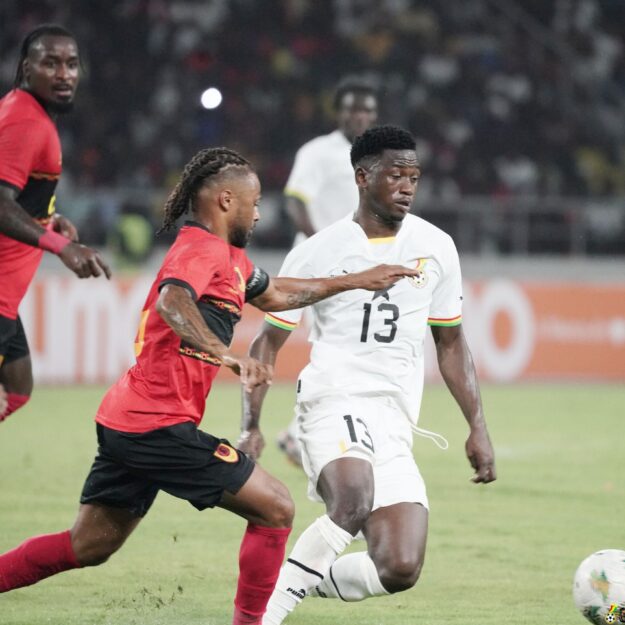
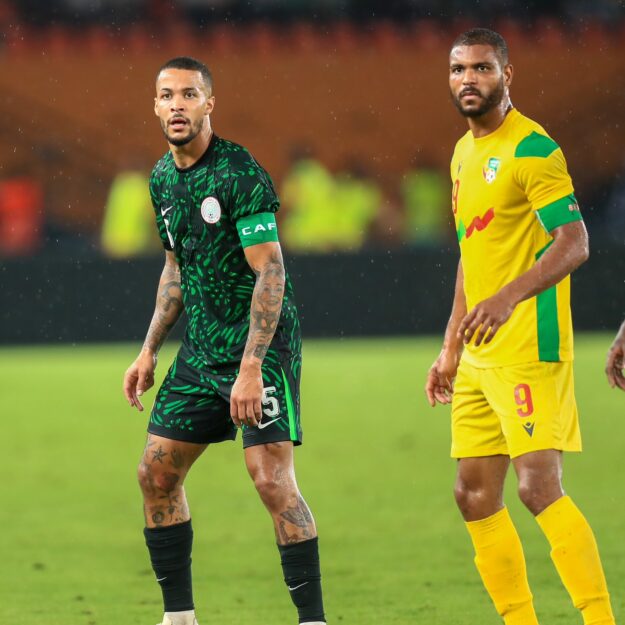


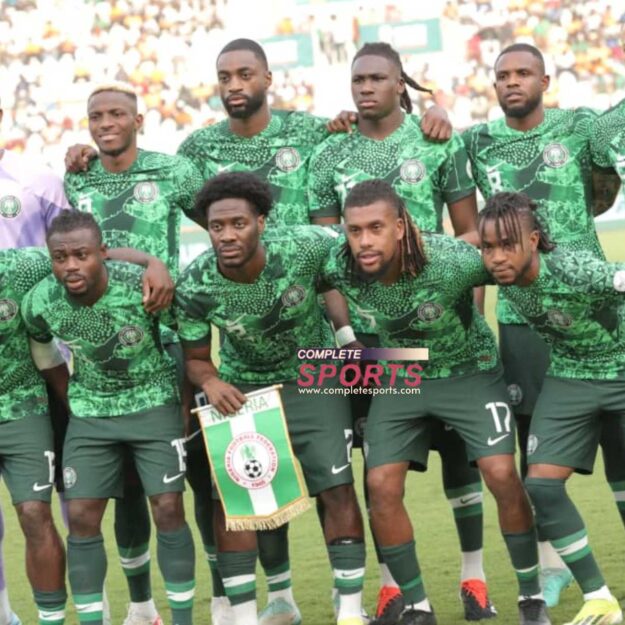


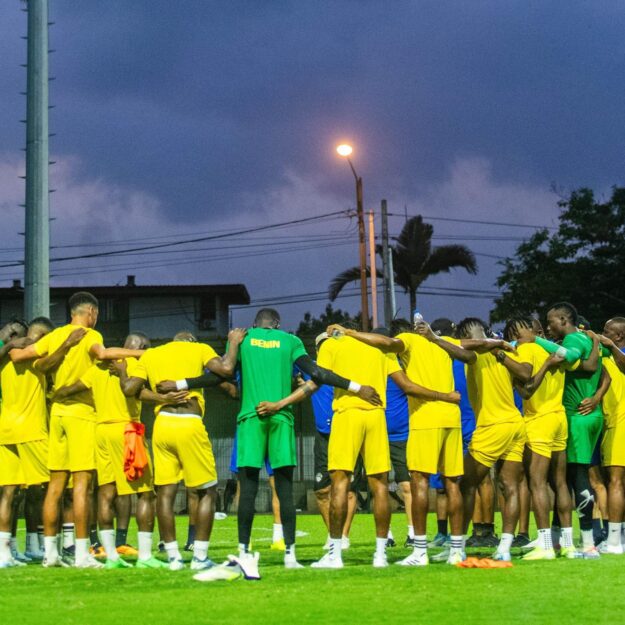

![American Pastor, David Wilson Seen Eating The Box Of Woman Who Isn’t His Wife [Video]](https://onlinenigeria.com/wp-content/uploads/2019/10/american-pastor-david-wilson-seen-eating-the-box-of-woman-who-isnt-his-wife-video-150x150.jpg)









